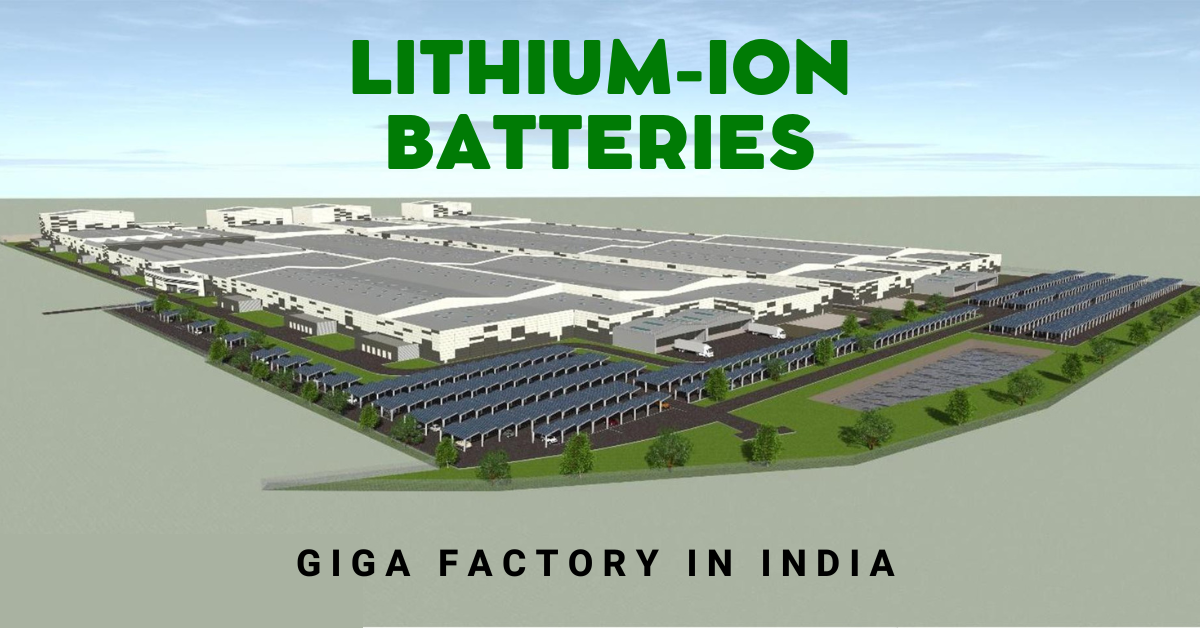
“We actually did the calculations to figure out what it would take to transition the whole world to sustainable energy. You’d need 100 Gigafactories.” ~ Elon Musk
India is currently making significant progress towards sustainability to keep its promise to the international community and assist in becoming carbon neutral. Electric vehicles (EVs), known for their silent operation and zero tailpipe emissions, can play an essential role in this effort by reducing CO2 emissions from automobiles. The automotive sector is currently undergoing a captivating transformation, with Tesla leading the way as the pioneering manufacturer of lithium-ion battery-powered cars since 2008. Tesla’s remarkable success as an American EV startup has positioned it as the world’s largest electric vehicle manufacturer, producing various vehicle models at its renowned GIGA factories. Consequently, the term “GIGA” has gained popularity through Tesla’s groundbreaking initiatives.
India wants to build Lithium-ion battery Gigafactory in India to boost domestic manufacturing, reduce imports, and support the growing demand for electric vehicles and renewable energy. These ambitious plans include building 12 giga factories by 2030 to help India become the next battery exporter and boost clean energy job growth. India is well-positioned to lead the global transition to sustainable transportation and energy storage due to its innovation and manufacturing capabilities.
What is a Gigafactory?
The name Giga factory has been created from the word ‘Giga’, the unit of measurement representing “billions.” Simply put, Giga factories are large-scale factories that can enable economies of scale and minimise costs through innovative manufacturing, reduced logistics waste, optimised co-located processes, and reduced overheads. They intend to provide end-to-end handling of batteries, from raw materials to components to finished products, and recycling old batteries. Batteries produced in these plants will cater to electric vehicles, the consumer electronics industry, and electricity grids.
India’s plans for giga factory infrastructure
- The Government approved the Production Linked Incentive (PLI) Scheme ‘National Programme on Advanced Chemistry Cell (ACC) Battery Storage’ for achieving manufacturing capacity of Fifty (50) Giga Watt Hour (GWh) of ACC for enhancing India’s Manufacturing Capabilities with a budgetary outlay of ₹ 18,100 crore.
- India Giga factory plan to boost and support its sustainable energy targets. These giga Factories intend to provide end-to-end handling of batteries, from raw materials to components to finished products, and recycling old batteries.
- India plans to set up 12 giga factories by 2030 to manufacture lithium-ion batteries to support electric vehicles (EVs) and renewable energy generation.
- Driven by manufacturing and innovation potential, India holds the capacity to become a net exporter of batteries to support burgeoning global demand.
- The targeted 1,000 megawatt-hours of battery capacity will power 10 lakh homes or about 30,000 electric cars for the same period.
- India can benefit significantly from domestic lithium-ion battery production. Electronic vehicles’ most expensive parts are these. The large-scale electric battery manufacturing and storage plan aims to make storage systems competitive in India, making electric vehicles more feasible.
- India’s vehicle electrification, renewable energy integration, and job growth goals will benefit from abundant, inexpensive “Made in India” batteries. Exporting such batteries will accelerate the global clean energy transition.
- Wind and solar power’s intermittent output necessitates battery storage. It will regulate energy flow, giving states more electricity during peak loads and storing excess energy during high production.
Table of Contents
Top Players to set up Lithium-ion Battery Gigafactory In India
Ola GIGA Factory
One of India’s largest electric vehicle manufacturers, Ola Electric, has announced plans to build a 100 GWh Giga factory. With an initial capacity of 5 GWh, construction on this project has already begun, and it is expected to be fully operational by the end of the current fiscal year (2023). The 115-acre site of this Giga factory can be found in Krishnagar, Tamil Nadu.
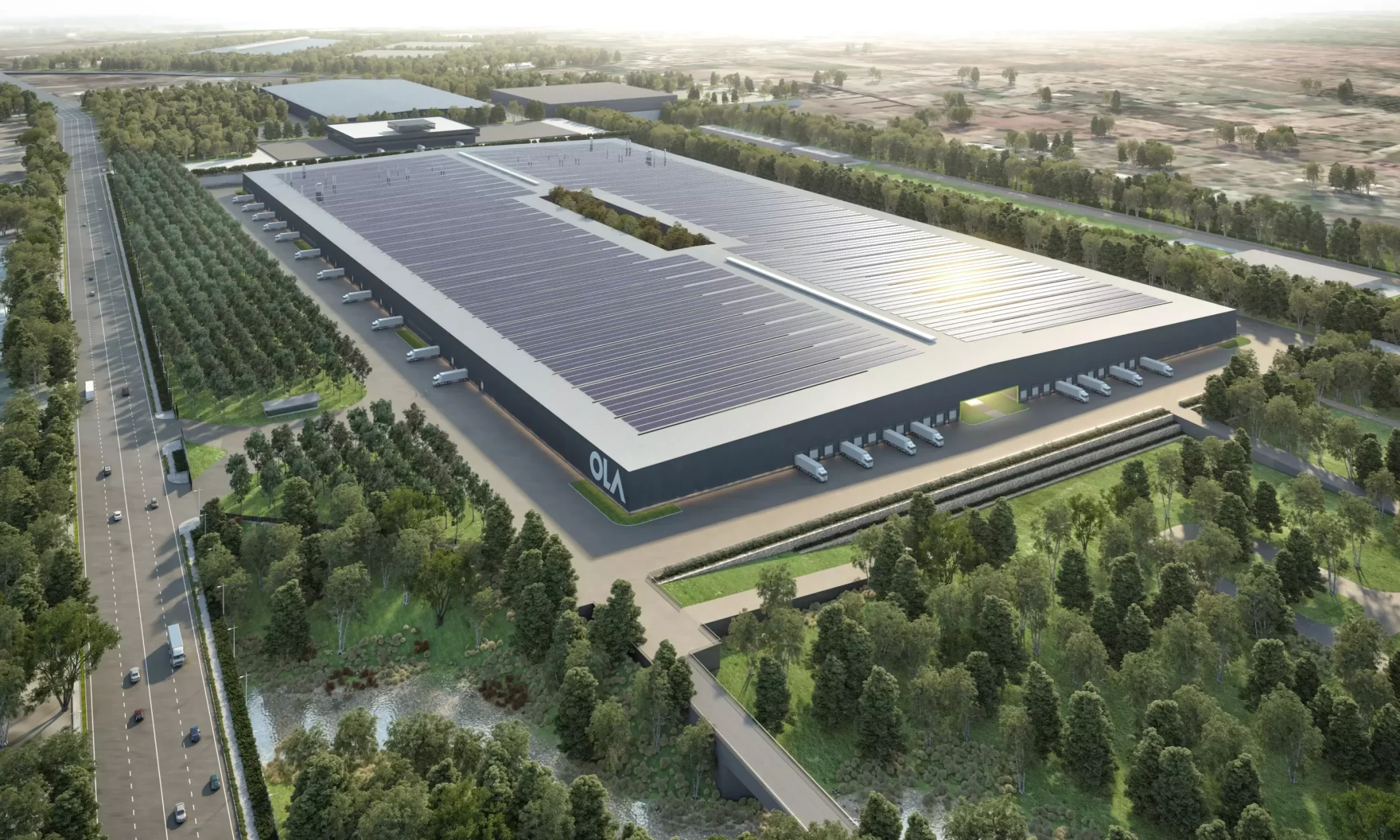
The plant intends to produce all the battery manufacturing supply chain components to reduce reliance on battery supplies abroad. The production of NMC 2170 battery cells is the initial objective.
Bhavish Aggarwal, Founder, and CEO of Ola, said, “This is a proud moment for us as we installed the first pillar of our Gigafactory today. Our Gigafactory will be a major milestone in India’s electrification journey, bringing us closer to making India a global EV hub. With our focus on innovation, technology, and manufacturing at scale, we are committed to driving the future of electric and #EndICEAge.”
Amara Raja Batteries
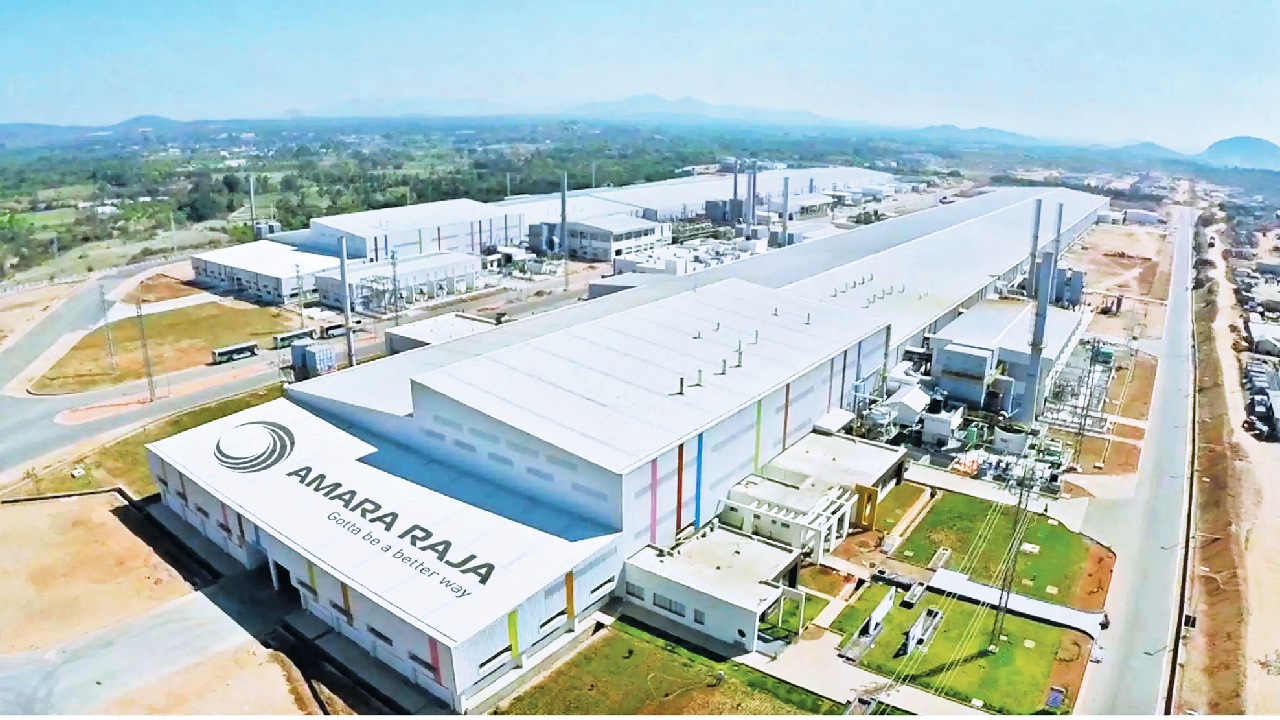
Amara Raja Batteries Limited has recently inaugurated the most extensive Gigafactory in Telangana, with a projected investment of Rs 9,500 crore over the forthcoming decade. The establishment shall produce lithium-ion batteries with a maximum capacity of 16 GWh for lithium cells and 5 GWh for battery packs. The significance of the inauguration was underscored by the attendance of K T Rama Rao, the esteemed IT and industries minister of Telangana, who highlighted its pertinence to the state’s objectives regarding electric vehicles and sustainable mobility. The corporation is set to allocate a sum ranging from Rs 1,500 crore to Rs 2,000 crore for its initial phase, which is anticipated to conclude within two to three years. This Gigafactory in Telangana positions the region as a significant contender in India’s burgeoning battery manufacturing and electric vehicle industry. This new facility in Telangana plans to create employment opportunities for nearly 4,500 people and a similar number of indirect jobs.
Ramachandra N. Galla, the founder of Amara Raja Group, commented on the same and said, “Amara Raja’s core purpose has always been to build institutions that provide better opportunities to more and more people, and this beginning today will transform this region in the years to come.”
Exide Industries
Exide Industries, a leading battery manufacturer, is set to invest Rs 6,000 crore in establishing a state-of-the-art Lithium-ion cell manufacturing factory in Karnataka. The proposed Gigafactory will utilise advanced cell chemistry (ACC) technology tailored to meet the diverse requirements of the electric vehicle (EV) and industrial segments. This significant development in the EV field showcases Exide’s commitment to driving innovation and supporting the Indian market’s growing demand for sustainable energy solutions.
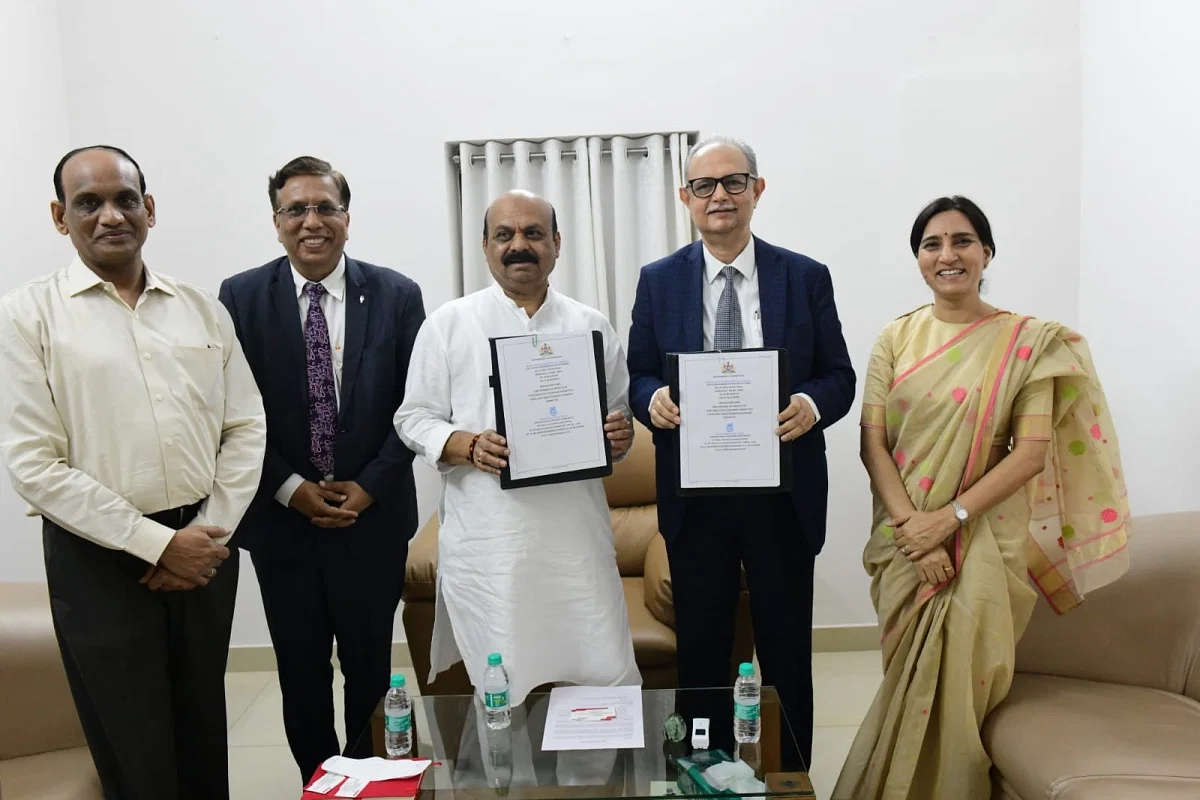
As part of its ambitious plans, Exide will collaborate with SVOLT Energy Technology, a renowned Chinese storage battery firm, for localised manufacturing in India. Exide will commercialise SVOLT’s lithium-ion cell technology through this partnership, propelling India’s domestic battery production capabilities to new heights. Additionally, Exide aims to establish a dedicated research and development (R&D) laboratory and pilot line to foster new product development, further enhancing the company’s technological expertise and product offerings in the Indian market.
To facilitate this transformative venture, Exide Industries has requested 80 acres of land in the Haraluru Industrial Area near the Kempegowda International Airport, approximately 40 km from Bengaluru. This strategic location will provide convenient access to transportation networks and enable seamless operations. The proposed facility, expected to commence operations by the end of 2024, will emerge as one of India’s largest giga factories featuring Advanced Cell Chemistry Technology. This cutting-edge facility is projected to generate between 1,200 to 1,400 job opportunities, contributing to the region’s economic growth and creating a skilled workforce in advanced battery technologies.
Tata Group – Tata Power/Tata Chemicals
In Gujarat’s Dholera Special Investment Region, the Tata Group, the parent company of Tata Motors, has committed a sizeable investment of 4,000 crores to construct a lithium-ion battery plant. This action demonstrates their dedication to environmentally friendly transportation and establishes them as a significant force in the electric vehicle market. The project, which aims to have a production capacity of 10 GWh, will be carried out in stages with an initial investment of 25% of the desired sum. Dholera was chosen because of its advantageous characteristics, including its easy access to land with clear ownership and affordable electricity rates. This is the first Giga factory for Lithium-Ion batteries in the Gujrat state.
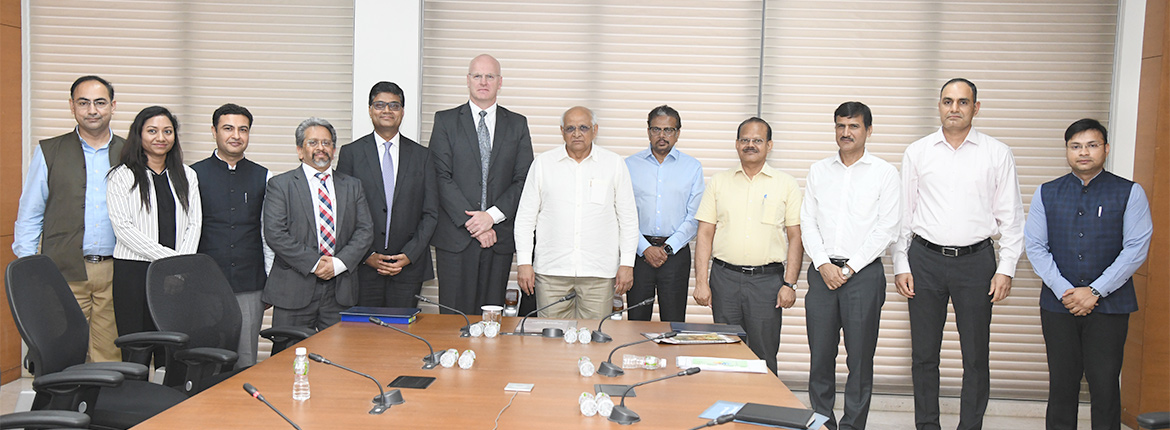
The significant investment made by the Tata Group in the Gujarat lithium-ion battery plant demonstrates their dedication to promoting sustainable transportation and assisting India’s clean energy objectives. Tata Group wants to advance the development of the electric vehicle market and contribute to a greener, cleaner future by establishing itself as a leader in battery production.
Tata Chemicals Managing Director and Chief Executive Officer R Mukundan said, “Overall assumption for India’s demand in the auto sector will be about seven million vehicles. In addition, a large proportion of that will pivot towards electric vehicles (EVs)”
Lucas TVS & 24M Technologies
Lucas TVS and 24M Technologies have collaborated to establish a pioneering GIGA factory in India, focusing on developing next-generation lithium-ion batteries based on their partner’s state-of-the-art semisolid platform technology. The first plant is set to be established in Thervoy Kandigai, Gunnidipundi, in nearby Chennai. The plant is expected to commence commercial production by the end of the current fiscal year, 2023. The establishment endeavors to attain a target capacity of 10 GWh, which will be targeted to complete in two-phase.
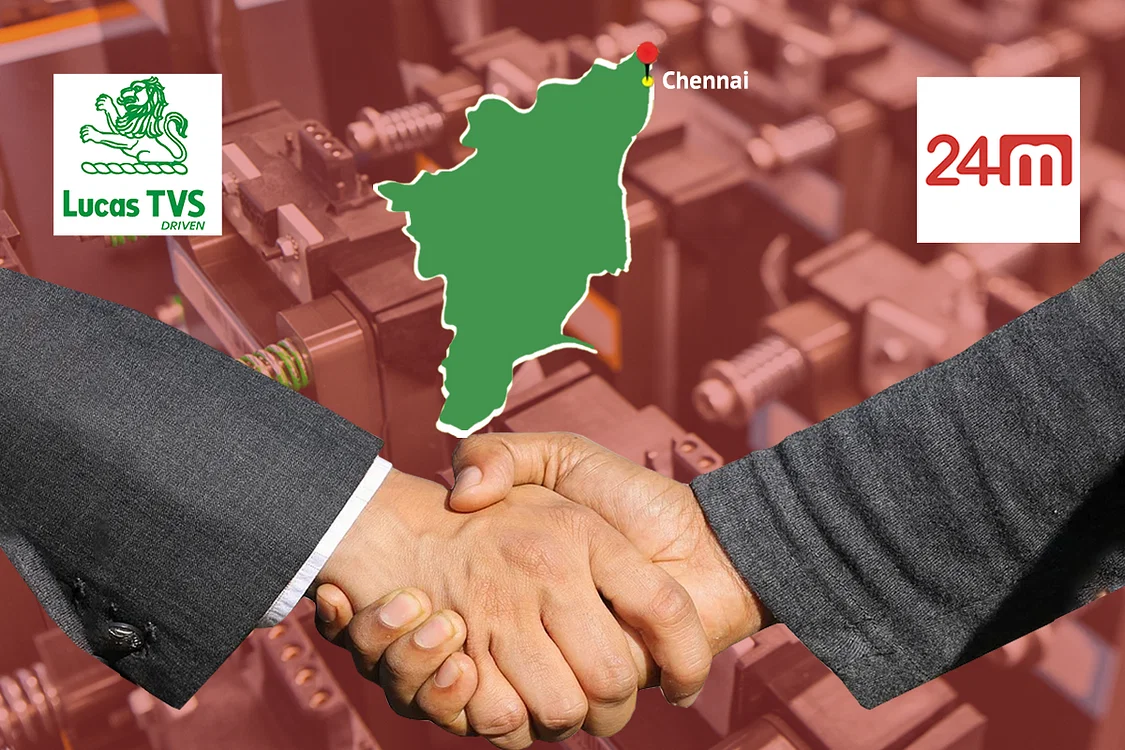
TVS strategically partnered with 24M Technologies because of their remarkable proficiency in the domain, evidenced by their extensive collection of more than 80 granted patents and a further 100 patents currently in the developmental phase. The technology at hand facilitates the creation of electrodes with increased thickness, enhancing their energy density and concurrently reducing costs. Moreover, the sophisticated cellular architecture of 24M guarantees enhanced safety, dependability, and traceability by eliminating possible metal impurities, a prevalent factor contributing to short-circuits in traditional Lithium-ion batteries.
Through the strategic collaboration of their respective capabilities, the collaborative effort between Lucas TVS and 24M Technologies endeavours to transform the battery production domain in India. The collaborative enterprise is poised to augment energy storage proficiency while prioritising safety and cost-efficiency, ultimately triggering the widespread integration of electric vehicles and environmentally friendly energy alternatives.
According to T K Balaji, the Chairman and Managing director of Lucas TVS, “Lucas TVS believes in investing in next-generation technologies, which is why we choose to partner with 24M” He further added, “We are confident that the innovative SemiSolid TM platform technology will enable us to provide our customers affordable e-mobility, lead acid battery replacement and storage solutions with improved quality the best in class safety;”
Godi India
Godi India, with its headquarters in Hyderabad operations, has recently announced its intention to construct a giga factory in India exclusively dedicated to manufacturing lithium-ion cells for electric vehicles. This noteworthy attempt demonstrates the corporation’s dedication to producing electric batteries on a grandiose magnitude and propelling the progression of the electric vehicle sector.
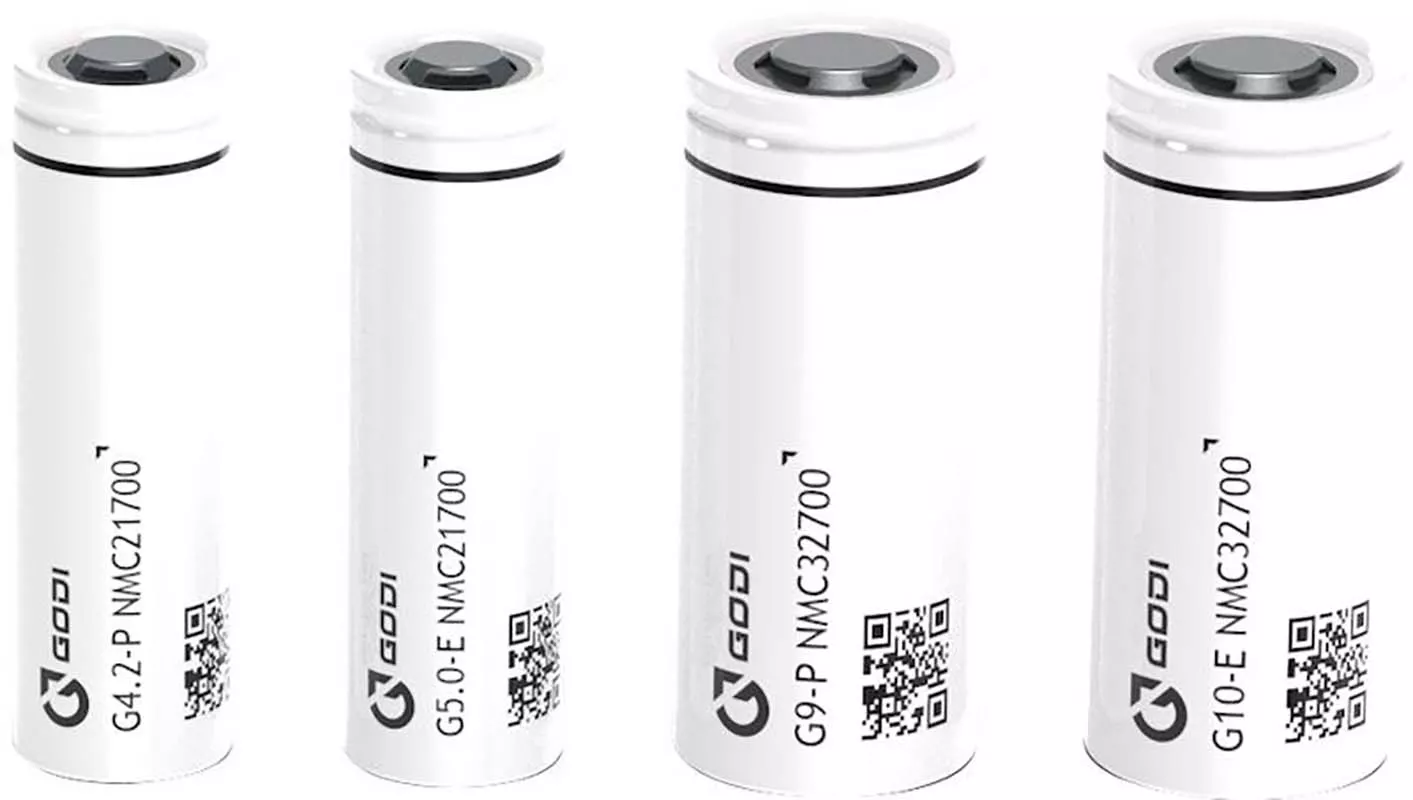
It is noteworthy that Godi India has become the inaugural company in India to secure certification from the Bureau of Indian Standards (BIS) for its lithium-ion cells, which were created utilising native technology. Godi’s cells were subjected to meticulous examinations and assessments by the esteemed third-party testing entity, TUV, to comply with the stringent BIS regulations.
Through establishing a giga factory, Godi India endeavours to fortify the nation’s indigenous manufacturing of lithium-ion cells, thereby mitigating reliance on external sources and fostering the expansion of the electric vehicle sector. The manoeuvre above exemplifies Godi’s unwavering commitment to technological advancement, superior production standards, and bolstering India’s shift towards eco-friendly modes of transportation. The inauguration of the giga factory positions Godi India to assume a pivotal function in expediting the integration of electric vehicles in India and propelling the country’s sustainable energy objectives.
Mahesh Godi, founder and chief executive officer of Godi India said “Electric Vehicle penetration in India is expected to become a reality in the near future. As a result, lithium-ion battery-based storage solutions will gain prominence and localization of tailor-made cells for Indian conditions will play a vital role, for both automotive and energy storage applications (ESS). As a cell technology player, we would like to be part of this exciting journey,” He further added, “India is expected to be one of the world’s largest and fastest-growing markets for electric vehicles and the customers look for safer and longer-range batteries. Sensing the need, we are setting up our first indigenous giga factory for lithium-ion cell manufacturing in India by 2024,”
Cygni Energy
In 2016, Cygni achieved the honour of being the inaugural brand recognized under the ‘Make in India’ (Start-up India) initiative. Today, Cygni is embarking on a groundbreaking venture in Telangana by establishing a cutting-edge Gigafactory. With an impressive capacity of 1,200 MWh, this facility is poised to produce approximately 400,000 battery packs annually.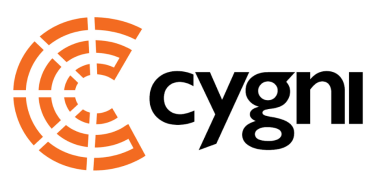
The Gigafactory itself is a testament to innovation, boasting state-of-the-art manufacturing capabilities. Equipped with advanced technologies such as laser welding, automatic cell sorting, and EOL testing, this greenfield facility utilizes portable machines and equipment to ensure efficiency and precision.
It’s worth noting that the field of battery technology is constantly evolving, with expectations of continuous advancements over the coming years. Cygni is prepared to adapt and stay at the forefront of this dynamic industry, consistently striving to deliver the best possible battery solutions.
Venkat Rajaraman, CEO of Cygni Energy, said, “The need for enhancing EV battery performance, safety and access to quality products has never been more pressing. This round of funding will help us strengthen our product offering & set up the greenfield manufacturing facility with a capacity of 1.2GWh per annum. This not only validates our belief in technology but also accelerates the scale of manufacturing.”
Lithium-ion batteries Gigafactory around the world
| No. | Company | Location | Capacity |
| 1 | Tesla Gigafactory 1 | Sparks, Nevada, USA | 35 GWh |
| 2 | Tesla Gigafactory Shanghai | Shanghai, China | 40 GWh |
| 3 | Tesla Gigafactory Berlin | Grünheide, Germany | Up to 500,000 EVs/year |
| 4 | CATL European Gigafactory | Erfurt, Germany | 14 GWh initially |
| 5 | LG Energy Solution Poland Gigafactory | Wrocław, Poland | 70 GWh/year |
| 6 | SK Innovation Georgia Gigafactory | Commerce, Georgia, USA | 10 GWh/year |
| 7 | Volkswagen Group Electric Vehicle Battery Cell Factory | Salzgitter, Germany | 16 GWh/ |
Conclusion
Electric vehicles are the hottest story in the market right now. Establishing giga factories, large-scale manufacturing facilities dedicated to lithium-ion cell production for electric vehicles is a significant increase in India’s EV industry. India intends to transition from fossil fuel-powered vehicles to electric vehicles (EVs) as part of its commitment to sustainability and reducing carbon emissions. Tesla’s success in pioneering electric vehicles sparked this transformation, with Tesla’s gigafactories being the world’s largest EV manufacturing plants.
India’s commitment to sustainability, job creation, and technological innovation is fully displayed with the boom of giga factories in the EV industry. As the country strives to become a major player in the global electric vehicle and clean energy market, these factories clearly indicate its aspirations and dedication to a brighter, more sustainable future.

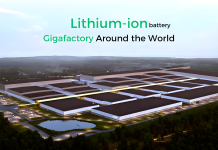
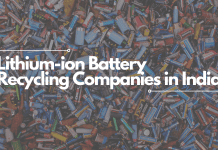




Great …
However What Are The Negative Effects Over Human Body…
Will It Have Any Impact On Health Related Issues …
Thank You
By which mode of payment you collect 199.
Can you do by netbanking?
A good overview of the Giga players. Perhaps a look at the smaller ones too??
Your point is noted. I will cover it in upcoming articles
Hi e-vehicleinfo.com admin, Thanks for the in-depth post!
What about li battery recycling I am interested in this can you call me in 7670041700